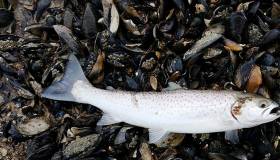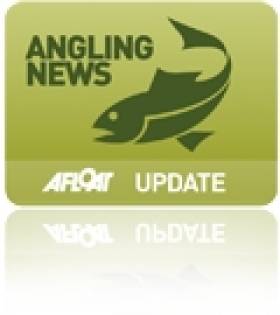Displaying items by tag: salmon farming
Inland Fisheries Ireland Seeks Judicial Review of Decision to Grant Bantry Bay Aquaculture Licence
Inland Fisheries Ireland (IFI) has confirmed that it is seeking a judicial review into the granting of an aquaculture licence for Atlantic salmon at in Bantry Bay.
As the matter is due before the High Court tomorrow, Tuesday 28 September, and the State agency with responsibility for the protection and conservation of freshwater fish and habitats says “it will not be possible…to make any further comments at this stage in the process”.
As previously reported on Afloat.ie, a licence was granted by the Aquaculture Licences Appeals Board this summer — following a protracted appeals process over several years — to Mowi Ireland for an 18-pen facility at Shot Head in Co Cork.
TheJournal.ie reports that Ireland’s largest operator of salmon farms has been granted a licence for an 18-pen facility in Bantry Bay.
Nine years ago Afloat.ie noted proposals for the salmon farm at Shot Head, with local campaigners arguing then that Bantry Bay had reached its capacity for aquaculture.
Following a protracted appeals process over several years, Mowi Ireland has now been given the go-ahead to harvest as much as 2,800 of salmon every two years.
However the proposals remain strongly opposed by locals, environmental groups and even State agency Inland Fisheries Ireland, with concerns over the impact of salmon farming on marine biodiversity.
TheJournal.ie has more on the story HERE.
Ireland’s Salmon Farming Industry Under the Microscope
The latest investigation from TheJournal.ie’s Noteworthy platform looks at the impact of salmon farming on marine biodiversity — and the findings make for sober reading.
Concerns over the impact on wild Atlantic salmon from sea lice and disease in salmon farms, as well as farm escapes that threaten hybridisation, are high on the agenda.
In spite of claims that the State’s monitoring system is “robust” and is “representing best practice”, Ireland received a rating of unsatisfactory from the North Atlantic Salmon Conservation Organisation (NASCO) earlier this year.
One study has identified a possible link between reduced salmon runs and high rates of sea lice infestation in salmon aquaculture projects over a 30-year period.
And methods of controlling sea lice have not escaped scrutiny, either, with the practice of harvesting wrasse from sensitive reef habitats to act as ‘cleaner fish’ raising concern.
Meanwhile, it’s emerged that 22 salmon farms in the State have expired licences and are missing environmental assessments required under EU law.
Documents seen by Noteworthy reveal tensions within the Department of the Marine as to its handling of potential licence breaches, which may include discharges of ammonia and phosphates.
The investigation also reveals that the National Parks and Wildlife Service (NPWS) issued 11 licences to shoot seals — a protected species — to salmon farms between 2015 and 2020, with at least five seals believed to have been killed as a result. Seal Rescue Ireland argues that there is “no scientific support” for this cull.
Find much more in Noteworthy’s three-part ‘Troubled Waters’ investigation HERE.
A resolution by Green MEP for Ireland South, Grace O'Sullivan, calling on the Commission to block the use of a toxic neonicotinoid in the EU's fish farms will be voted this week by the European Parliament's Committee on the Environment, Public Health and Food Safety.
The Imidacloprid pesticide, which has been linked to biodiversity loss and a decline in bee populations, has been banned in the EU for certain agricultural uses on land. There is mounting evidence that the use of this neonicotinoid has a devastating impact on rivers and waterways and its use in Japan has been linked to a dramatic collapse of fish stocks.
Despite this, the European Commission is proposing to establish a Maximum Residue Level for Imidacloprid, which will clear the way for the pesticide's use in EU aquaculture as a treatment for sea lice.
Speaking before the Committee meeting today, Grace O'Sullivan said "I am very concerned by the Commission's proposal which would allow the use of dangerous neonicotinoids in fish farming. We know that this very chemical has devastating impacts on the environment and biodiversity. For this very reason the EU already banned its use on certain crops, a decision more recently upheld by the European Court of Justice. If Imidacloprid is too damaging to go on our crops, how can we accept it in our marine environment?"
The objection was considered in Committee on Thursday, 27 May 2021, and a vote will take place this morning, Friday, May 28th.
The Board of Inland Fisheries Ireland has welcomed new research by scientists from Inland Fisheries Ireland and Argyll Fisheries Trust (Scotland) which found that sea trout carry significantly higher levels of sea lice infestation closer to marine salmon farms. Researchers examined sea lice levels over 25 years from more than 20,000 sea trout. The sea trout were sampled from 94 separate river and lake systems in Ireland and Scotland at varying distances from salmon farms.
The research revealed that sea trout captured closer to salmon farms had significantly higher levels of lice infestation and were found to be of reduced weight. Sea trout are known to remain for extended periods in near-coastal waters where the majority of salmon farms are located. This fish is therefore particularly vulnerable to sea lice impact, having the potential to encounter lice of farm origin throughout much of its marine life.
The effect of the increased lice infestation was most evident in years of less rainfall, when a sea trout of average length (180mm) caught within 10 kilometres of a farm could weigh up to 10g less than fish of similar length caught more than 40 kilometres from a farm. The study covered the entire coasts of West Ireland and Scotland and accounted for variability in temperature and rainfall.
The research article entitled ‘Aquaculture and environmental drivers of salmon lice infestation and body condition in sea trout’ was authored by Dr. Samuel Shephard and Dr. Paddy Gargan of Inland Fisheries Ireland alongside Craig MacIntyre of the Argyll Fisheries Trust. It was published in the international journal Aquaculture Environment Interactions in October.
Studies have shown that the impact of sea lice in farmed areas on sea trout has been substantial with increased mortality, reduced body condition and a changed migratory behavior reported. Heavily liced sea trout return to freshwater prematurely to rid themselves of lice and exhibit very poor marine growth and greatly reduced marine survival. In fact, the most heavily lice infested sea trout die at sea. Rod catch data from 18 Connemara fisheries from 1974 to 2014 show a collapse in rod catch over the 1989/1990 period (see Figure 1). This collapse has been linked to lice infestation from salmon farms while recovery of sea trout rod catches to pre collapse levels has not occurred.
Sea trout offer significant angling value while traditionally the species was abundant on the west coast of Ireland. Angling is worth €836 million to the Irish economy every year and supports upwards of 11,000 jobs, often in rural and peripheral communities. Inland Fisheries Ireland carries out research across fish populations, their habitats and the ecosystem with a view to informing the protection and conservation of this precious resource.
Dr. Paddy Gargan, Senior Research Officer at Inland Fisheries Ireland and one of the report authors, said: “”While there had been some improvement in sea lice control in recent years, lice control on salmon farms was still not sufficient in certain west of Ireland bays during the spring migration period for sea trout to avoid heavy lice infestation and increased marine mortality. More effort is required to ensure lice levels on salmon farms are adequately controlled at this critical period when sea trout leave freshwater and enter the sea.”
Dr. Cathal Gallagher, Head of Research and Development at Inland Fisheries Ireland said: “The finding that salmon farming is responsible for increased sea lice infestation and for significantly reduced body condition in sea trout may have implications for current lice control management strategies. This research will inform coastal zone planning of aquaculture in the future and contribute towards the avoidance of potential impact on sea trout stocks.
Inland Fisheries Ireland is committed to protecting and conserving our fish populations and this research is crucial in managing the sea trout species in Ireland. This country is known as a unique angling destination as a result of its indigenous wild fish species and beautiful scenery. Continued investment in research is necessary to ensure the conservation and protection of our fisheries resource.”
Vigilance Urged Over Salmon Lice
Salmon farmers have been reminded of the dangers of egg-bearing lice, despite a "sustained reduction" in their numbers according to a new report.
"Pest control will always remain a challenge requiring active management," said Minister of State for Fisheries Sean Connick, as quoted by The Irish Times.
The minister spoke at the launch of a report by the National Implementation Group (NIG) for improving pest control in Ireland's salmon farms.
The report noted that the majority of facilities maintained lice level below trigger levels for treatment, and where treatment was necessary it was conducted effectively.
In response to the report, Salmon Watch Ireland (SWI) claims that the risks to wild salmonids "by inadequately regulated salmon farming" are being ignored, threatening juvenile salmon and sea trout.
It also highlighted the fact that Ireland is being pushed by the European Commission to conform salmon farming to EU Habitats Directive standards for wild salmon.
"The reality is that the regulation of the salmon farming industry is a shambles," said the SWI in a statement.
The Irish Times has more on the story HERE.
































































